DO-IT News June 2014

Volume 22, Number 3
Below are the articles of the DO-IT News June 2014 newsletter. These articles can also be seen all on one page at the Full Newsletter option.
Meet the 2014 Scholars!
This summer DO-IT will host its twenty-second annual Summer Study program for DO-IT Scholars, providing participants the opportunity to experience life on a college campus and explore challenging academic and career fields such as those in science, engineering, and computing. Primary funding for the Scholars program is provided by the State of Washington. For more information, visit www.washington.edu/doit/do-it-scholars.
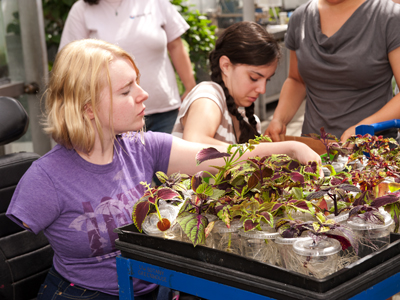
I am pleased to introduce you to the new Scholars:
Aja likes studying math and science at Glacier Peak High School in Everett. She has cerebral palsy. She participates in Future Farmers of America competitions and plans to study neurobiology in college.
Alex attends the International School in Bellevue. He enjoys math and science and is interested in securing a career in these skills. He has an autism spectrum disorder.
Anita's two favorite classes are math and biology at Seattle Academy of Arts and Sciences. She aspires to be a teacher or psychologist. Swimming is her sport of choice.
Calleese enjoys her science and English classes at Vancouver iTech Preparatory. She will be taking classes with Running Start in September. She is in the orchestra, belongs to the Key Club, and is a member of the yearbook staff. In her free time, she likes to volunteer. Her disability affects her reading and writing.
Carl would like to study business or law after graduating from Woodinville High School. His favorite classes are history and math. He hopes to join the Future Business Leaders of America. Carl has Duchenne muscular dystrophy.
Eric, who has a visual impairment, keeps busy outside of school with soccer, drums, and volunteer work. At Skyline High School, he enjoys classes in math and science. In college, he thinks he will major in computer engineering or business.
Jason, who is busy with cross country, swimming, and track, saves time for his academic interests in math and science. He would like to pursue engineering. Jason attends Mountlake Terrace High School and is legally blind.
Jin Ning's favorite classes are math and reading. He is on the honor roll at Roosevelt High School in Seattle. He wants to attend a college where being hard of hearing will be appropriately accommodated.
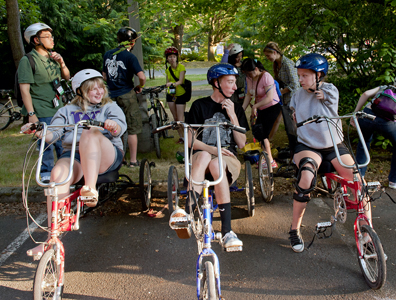
Kennedy attends Wilson High School in Tacoma. He has cerebral palsy. His favorite classes are science and English, and he would like to be a psychologist.
Lindsey has spinal muscular atrophy type 2. She enjoys her classes in English and digital graphic arts at Graham-Kapowsin High School. She plans on study literary arts in college.
Mike is an advisory representative in student government at Tonasket High School. He is also active in a youth group. He is visually impaired with right-sided weakness. He enjoys using technology.
Mikaela would like to go in to the medical field. Her favorite classes are health science and technology. She attends Running Start classes at Columbia Basin College.
Matthew likes studying engineering and science. He attends high school in Spokane. He would like to study mechanical engineering in college.
Sangha has an autism spectrum disorder. He would like to be a computer programmer. He enjoys his classes in math and music at Bellevue High School. He likes to play video games in his spare time.
Sean enjoys engineering and math classes at South Kitsap High School. With his experiences in auto shop, he helps his family save gas and diagnose issues. He looks forward to going to college.
Teo, who has a learning disability, wants to be a computer engineer. His favorite classes are science and math at Granite Falls High School. He is an active member of the Associated Student Body.
Thor was 10th grade homecoming royalty at Burlington-Edison High School. He likes history and English. He plans on studying accounting, forensic science, and ranching in college. He recently built a website for his family ranch. Thor has desmin myopathy muscular dystrophy.
Vanessa likes math and computing classes and enjoys photography. Her ideal job is food critic. Vanessa has Ollier's disease and Maffucci syndrome. She lives in Clinton.
Scholar Profile: Melissa
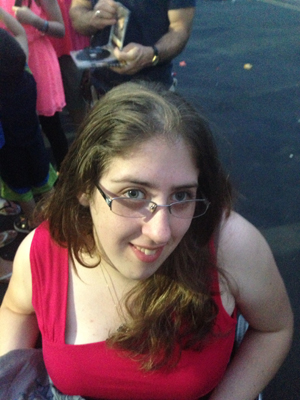
My name is Melissa Niklason. I started out as a DO-IT Scholar in 2009. The people I've met through this program and opportunities I have been given are more than I could have ever hoped for!
My road through education has been long, but it is also one that I would not change. After graduating from Woodinville High School in 2009, it took me a little over two years to complete my associates degree from Cascadia Community College. In March 2012, I started at Central Washington University in Ellensburg, Washington as an English/language arts teaching major, and I am set to graduate with my bachelor's degree in December 2014. It is my goal to one day teach English or language arts at the 6th or 7th grade level.
The DO-IT community has helped me both personally and professionally. Last year, around March 2013, Tami Tidwell sent me an email about available summer school teaching assistant positions through the Robinson Center for Young Scholars at the UW. I immediately jumped at the chance and was accepted as a teaching assistant for the 7th grade essay writing class. Mike, the teacher I worked with, had me teaching weekly lessons. I had never done it before, and I realized it was a skill that I was not particularly good at yet. I'm the type of person who overthinks and is constantly afraid that I will mess up, and that showed in my teaching. Mike said that the more nervous I felt, the more I should project that as excitement to my students. If it looks like I'm having fun then the students will have more fun. Working with everyone at the Robinson Center made me realize that I still have a lot to learn, and it reignited my passion to do just that.
If it wasn't for all the supportive people in my life, the DO-IT community included, I might not have gone on the biggest adventure of my life. I spent Fall quarter 2013 studying abroad in Dundee, Scotland, and it was one of the most challenging and rewarding experiences ever. For one thing, Dundee is not the most wheelchair-friendly city; the sidewalks are a mix of flat concrete and cobblestones. During my first full day there, I hit a crack in the sidewalk and tipped over in my chair. One of the many people who came over to help told me that I was now a true Dundonian. What a way to be welcomed to this wonderful city! Over the next three months, I met wonderful people from all around the world, saw the home of Mary, Queen of Scots, and even envisioned myself on a quest with King Arthur and his knights. I learned a lot about myself as well as about the people and the culture around me. I always knew that I wanted to teach, but now I would love to combine my passion for teaching with my newfound love of travel. Who knows- Someday I could be back in Dundee, teaching at the school I passed by countless times. The opportunities that I have before me are endless; the hard part is going to be choosing which one will be right for me.
If there is one thing that I have learned in all of my experiences, it's that the reward is so much greater than the risk. If I had let fear of new places rule my decisions, I would not have a more definitive vision on what I want to do in my life. I might have given up as soon as I found out that I needed to improve my teaching style. The hardest things in life are always the most worthwhile, and I can't wait to see where I will go next!
More information about the DO-IT Scholars program can be found at www.washington.edu/doit/programs/do-it-scholars/overview.
Disability and the Media: Part Three
In my last article (One Stop Shopping to Find Out If Your Vulnerable Applications are Up-To-Date), I talked about the importance of having people with disabilities both in front of the camera and in the writers' room. It is one way to avoid some common crimes of representation, such as "inspirational" characters with disabilities who are actually meant to be pitied and patronized; or disabled characters whose only purpose is to inspire a non-disabled character to be a "better person." This is objectifying and therefore dehumanizing. Portraying characters with disabilities as multi-dimensional, where the disability is not the character, but an aspect of the character, better represents the experience of having a disability.
Media can either oppress or empower. I've personally experienced both, so I see the influence that media images have in shaping the public's understanding of disabled people and their perspectives. Audiences will internalize images of disability and attribute them to disabled people as a whole. When portrayals oppress, they bolster stereotypes and misconceptions within society. When portrayals are empowering, they can change the way society thinks about disability for the better.
Take portrayals of mental illness. I've heard it said, "For every villain, there's a mental illness diagnosis." Mental illness is often used as a crutch (pun intended) for writers when creating a villain's motives and backstory. In Batman, the Joker is described as being schizophrenic. Norman Bates: Dissociative identity disorder (DID). Hannibal Lecter: Post traumatic stress disorder PTSD). Jack Torrance (The Shining): PTSD (and the whole being possessed by a demon thing). The Riddler: Obsessive compulsive disorder. James Moriarty: Narcissistic personality disorder. And the list goes on.
More subtle stereotypes in the media also contribute to the stigma of mental illness. People with mental illness are presented as being violent, unpredictable, able to be "cured," and a risk to themselves or others. Why is this harmful- These images and stereotypes have real-world consequences on how the public perceives mental illness. Research has shown that people get most of their information of mental illness from the media (Wahl, 2004). "What they see can color their perspective, leading them to fear, avoid, and discriminate against individuals with mental illness" (Tartakovsky, 2009). Furthermore, fear of stigma can prevent people with mental illnesses from getting treatment if it is something they need.
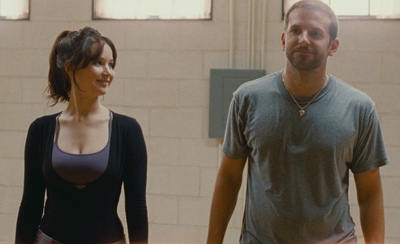
The movie Silver Linings Playbook (2012) has been called both a positive and negative representation of a person living with bipolar disorder. While most movies portray mental illness as slowly descending deeper and deeper into despair, Silver Linings Playbook shows a more realistic up, down, then up again pattern that many with bipolar disorder can relate to. However, The New Yorker movie critic Richard Brody believes "the movie will be a hit with those who think that hyperactivity is just a failure of discipline and depression merely a bad attitude."
Another seemingly mixed bag is the television show United States of Tara, which tells a story of a woman living with DID and her family. Tara has four "alters," each of whom have distinct personalities, identities, style, and priorities. There is no doubt that the show is over the top, and only representative of about 5% of individuals with DID (according to the International Society for the Study of Trauma and Dissociation), but it also balances fiction with reality. There are two main reasons why I love the show and why it does a better job at representing mental illness than most.
First, the producers of the show did their research. They included both those with DID and experts in the field in the process of writing the script. Second, the show covers many real-life issues that affect people with mental illnesses that are not often talked about. For example, Tara is constantly told by her sister that her DID isn't real; that Tara is in control but just wants attention, saying "It's not a disorder, it's a weakness." Often times people with mental illnesses are invalidated by loved ones because their disorder is not seen as real or legitimate. The relationship between Tara and her therapist delves into the causes and treatment of her DID. Tara eventually comes to terms that she is suffering from PTSD, and therefore can begin accepting and learning to cope with her DID.
The sad fact is that the occasional TV show with a balanced, multi-dimensional portrayal of disability still is not enough. Many times it is the harmful and untrue portrayals that contribute to how society perceives and reacts to mental illness. People in the media have the power to create positive change in portrayals of mental illnesses, and we should encourage them to use that power to legitimize the real world experiences of people who live with them.
The next installment of Ms. Brown's multi-part series will appear in the next issue of DO-IT News.
DO-IT Scholars Featured in Upcoming Closing the Gap Article
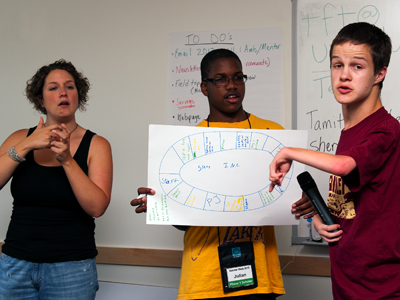
Multiple DO-IT Scholars are making an appearance in the upcoming issue of Closing the Gap Solutions, an online magazine offering resources and discussions on assistive technology. The article highlights the DO-IT Scholars program and specifically shares responses from the Intern Success Panel, an event each year where third-year participants discuss their own experiences with school, life, and their disabilities.
One of the students on the panel talked about DO-IT's Summer Study program, which takes place on the University of Washington campus, as an empowering experience; "camp is two weeks and that was something I have never done before . . . it really helped me learn how to be more independent-how to be more self-reliant." Other students discussed things they have learned in life, one student saying "I will have to deal with the situation myself and [learn to] see the problem positively, not negatively."
Closing the Gap works to provide resources and share information on assistive technology through webinars, an annual conference, and its online magazine, Solutions. Be sure to check out the full article and more great resources from Closing the Gap at www.closingthegap.com/solutions.
Call For Articles
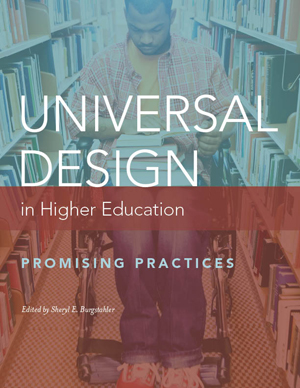
In DO-IT's online publication, Universal Design in Higher Education: Promising Practices, practitioners share promising practices related to the application of universal design in postsecondary education settings. This collection of promising practices complements the more general content in the printed book, Universal Design in Higher Education: From Principles to Practice, published by Harvard Education Press.
The new publication is available freely online at Universal Design in Higher Education: Promising Practices. It can be freely copied and distributed as a book or in part for noncommercial, educational purposes. The collection will continue to grow as more articles are submitted.
Articles may be submitted at any time to udhecop@uw.edu. Submitted articles should include specific ways practitioners and researchers have applied universal design in postsecondary settings along with evidence of success. They are peer-reviewed by members of the Universal Design in Higher Education Community of Practice (udhecop@uw.edu), and if accepted, edited by DO-IT. Articles selected for the online resource are freely available on our website. Authors must agree to these conditions while retaining copyrights to their individual contributions. For author guidelines, consult the preface of the book.
How can you DO-IT?
- Sign up to receive DO-IT News if this newsletter was not mailed directly to you.
- Volunteer as a Mentor or to help with one of our Summer Study programs.
- Pass this newsletter on to someone you know who can benefit from our programs.
- Donate money to support and extend DO-IT activities including sponsoring Scholars from states outside of Washington, special events, work-based learning experiences, participant attendant or travel costs, refreshments for program participants, and creation and distribution of educational videotapes and publications.
DO-IT today by completing the form below! You may also make a secure online credit card donation at the University of Washington Make a Gift page by selecting the "DO-IT Program Gift Fund" option.
___ Sign me up to receive copies of DO-IT News, a free program newsletter.
___ Send me more information about DO-IT volunteer opportunities.
___ I would like to make a donation (payable to the University of Washington, Federal ID#91-6001537) to support DO-IT operations.
___ I have enclosed a check for $____________
___ Please charge $____________ to my credit card.
___ VISA ___ Mastercard
Date _____________
Card Number __________________________ Expiration Date _____________
Card Holder Name ___________________________________________________
Signature _____________________________________________________
Address ____________________________________________________________
City __________________________ State _____________ Zip ____________
Phone: Home __________________________ Business ____________________
E-mail: ____________________________________________________________
Your gift is tax-deductible as specified in IRS regulations. Pursuant to RCW 19.09, the University of Washington is registered as a charitable organization with the Secretary of State, State of Washington. For more information, call the Office of the Secretary of State, 1-800-322-4483.
Mail to:
DO-IT
University of Washington
Box 354842
Seattle, WA 98195-4842
Thank you!
The Browser: Calendar of Events
The following is a partial list of conferences and training sessions that focus on technology, postsecondary education, and careers. DO-IT is represented at many of these events.
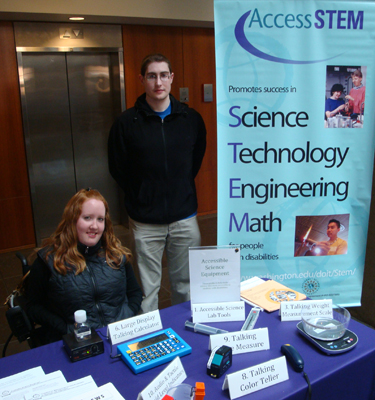
July 2014
- June 26 - July 1, 2014
American Library Association (ALA) - Las Vegas, NV
The ALA Annual Conference is the world's largest and most comprehensive library conference and exhibition. Drawing over 26,000 librarians, educators, writers, publishers and special guests, the conference includes more than 2,000 meetings, discussion groups and programs on topics affecting libraries. - June 28 - July 1, 2014
International Society for Technology in Education - San Antonio, TX
A conference for educators to learn how to improve education through the effective use of technology. - July 14 - 19, 2014
Association on Higher Education And Disability - Sacramento, CA
The Association on Higher Education and Disability's annual conference for staff who support students with disabilities on postsecondary campuses. - July 14 - 15, 2014
Computer Science & Information Technology (CSTA) Conference - St. Charles, IL
CSTA provides professional development opportunities for high school and middle school computer science and computer applications teachers who need practical, relevant information to help them prepare their students for the future.
August 2014
- August 12 - 14, 2014
University of Wisconsin-Madison -- Annual Distance Teaching & Learning Conference - Madison, WI
A premier conference in distance education, this event distance educators, trainers, and executives who represent a variety of professionals in higher education, business, government, and the military. - August 13 - 15, 2014
Society for Applied Learning Technology (SALT) Interactive Learning Technologies Conference - Reston, VA
The conference will bring professionals from the education, industry, and government communities together to provide a comprehensive overview of the latest in research, design, and development in order to furnish attendees information on systems that are applicable to their organizations.
September 2014
- September 30 - October 3, 2014
EDUCAUSE 2014 - Orlando, FL
A conference for IT professionals in higher education.
October 2014
- October 2 - 3, 2014
Council for Learning Disabilities International Conference on Learning Disabilities - Philadelphia, PA
The Council for Learning Disabilities (CLD) is an international organization concerned about issues related to students with learning disabilities. - October 8 - 11, 2014
National ACademic ADvising Association (NACADA) - Minneapolis, MN
NACADA is an association of professional advisors, counselors, faculty, administrators and students working to enhance the educational development of students. - October 12 - 14, 2014
California Association on Postsecondary Education and Disability (CAPED) - Santa Clara, CA
The mission of CAPED is to promote the full and effective participation of individuals with disabilities in all aspects of California Higher Education. - October 15 - 17, 2014
Closing the Gap - Minneapolis, MN
Conference on computer technology in special education and rehabilitation. - October 16 - 18, 2014
The National Science Teachers Association (NSTA) - Area Convention - Richmond, VA
Attendees include science teachers, science supervisors, administrators, scientists, and business and industry representatives. - October 23 - 24, 2014
The Washington Association on Postsecondary Education and Disability (WAPED) - Bellingham, WA
WAPED is a non-profit organization that provides support and training for professionals working in disability support services at postsecondary institutions throughout the state.
November 2014
- November 5 - 9, 2014
Professional and Organizational Development Network in Higher Education (POD) - Dallas, TX
POD fosters human development in higher education through faculty, instructional, and organizational development. POD's philosophy is lifelong, holistic, personal, and professional learning, growth, and change for the higher education community. - November 5 - 7, 2014
The Georgia Educational Technology Conference (GaETC) - Atlanta, GA
GaETC is dedicated to the professional development of educators. For over a decade, this conference has played a key role in helping educators at all levels increase their understanding of the role of technology in education. - November 6 - 8, 2014
The National Science Teachers Association (NSTA) - Area Convention - Orlando, FL
Attendees include science teachers, science supervisors, administrators, scientists, and business and industry representatives. - November 17 - 21, 2014
Accessing Higher Ground - Westminster, CO
Assistive Technology and Accessible Media in Higher Education. - November 19 - 21, 2014
WICHE Cooperative for Educational Telecommunications (WCET) - Portland, OR
WCET accelerates the adoption of effective practices and policies, advancing excellence in technology-enhanced teaching and learning in higher education. - November 20 - 22, 2014
ASHE American Society for Higher Education - Washington DC
The Association promotes collaboration among its members and others engaged in the study of higher education through research, conferences, and publications, including its highly regarded journal.
December 2014
- December 3, 2014
TASH - Washington DC
The TASH conference provides a forum for individuals with disabilities, families, researchers, educators, scholars, and others to create dialogue around creating action for social and systems reform. - December 4 - 6, 2014
The National Science Teachers Association (NSTA) - Area Convention - Long Beach, CA
Attendees include science teachers, science supervisors, administrators, scientists, and business and industry representatives.
January 2015
- January 7 - 10, 2015
The Association for Science Teacher Education (ASTE) International Conference - Portland, OR
The mission of the ASTE is to promote excellence in science teacher education world-wide through scholarship and innovation. The annual conference is held in January and is dedicated to continuing the professional growth and development of individuals who work in or have a strong interest in issues related to science teacher education at all grade levels. - January 21 - 24, 2015
Association of American Colleges and Universities - Washington, DC
AAC&U is the leading national association concerned with the quality, vitality, and public standing of undergraduate liberal education. - January 28 - 31, 2015
Assistive Technology Industry Association (ATIA) Conference and Exhibition - Orlando, FL
This conference offers wide variety of professional presentations and discussion about new assistive technology, practical applications, and services.
February 2015
- February 8 - 10, 2015
Pennsylvania Educational Technology Expo and Conference (PETE&C) - Hershey, PA
Technology conference supported by the Pennsylvania Department of Education. - February 25 - 28, 2015
Learning Disabilities Association of America's Annual International Conference - Chicago, IL
This annual conference attracts over 75,000 participants, primarily K-12 educators.
March 2015
- March 2 - 6, 2015
SITE - Society for Information Technology and Teacher Education International Conference - Las Vegas, NV
A conference, which focuses on the use of information technology in teacher education, and instruction about information technology in preservice, inservice, graduate teacher education and faculty and staff development. - March 2 - 7, 2015
CSUN - Technology & Persons with Disabilities Conference - San Diego, CA
Major, national conference on assistive technology with some accessible IT presentations. - March 12 - 15, 2015
The National Science Teachers Association (NSTA) - National Convention - Chicago, IL
Attendees include science teachers, science supervisors, administrators, scientists, and business and industry representatives. - March 14 - 17, 2015
American Council on Education (ACE) - Washington DC
ACE is the nation's unifying voice for higher education. ACE serves as a consensus leader on key higher education issues and seeks to influence public policy through advocacy, research, and program initiatives. - March 18 - 20, 2015
Northwest Council for Computer Education (NCCE) - Portland, OR
A conference for educators designed to support and advance the use of educational technology. - March 19 - 21, 2015
Computer Using Educators, Inc (CUE) - Palm Springs, CA
The CUE Conference is the largest and oldest education technology show in California, and among the largest in the United States. - March 21 - 25, 2015
National Association of Student Personnel Administrators (NASPA) - New Orleans, LA
A conference geared towards senior student affairs officers and administrators, student affairs professionals, faculty, and other educators. - March 21 - 23, 2015
National School Boards Association (NSBA) Annual Conference and Exposition - Nashville, TN
District administrators, school board members, principals, technology directors and coordinators, library/media specialists, and teachers. - March 26 - 28, 2015
International Technology and Engineering Educators Association (ITEEA) - Milwaukee, WI
The conference gives educators an opportunity for better understanding of the constant changes that take place in technology education.
April 2015
- April 8 - 11, 2015
Council for Exceptional Children's Annual Convention and Expo - San Diego, CA
A professional development event designed for all those who work with students with special learning needs! - April 16 - 20, 2015
American Educational Research Association (AERA) - Chicago, IL
AERA is a professional membership organization, that strives to improve the educational process by encouraging scholarly inquiry related to education. - April 16 - 19, 2015
American Occupational Therapy Association's Annual Conference & Expo - Nashville, TN
AOTA is the nationally recognized professional association of more than 35,000 occupational therapists, occupational therapy assistants, and students of occupational therapy. - April 18 - 21, 2015
American Association of Community Colleges - San Antonio, TX
AACC's membership represents close to 95 percent of all accredited U.S. two-year community, junior and technical colleges and their 10.5 million students, as well as a growing number of international members in Puerto Rico, Japan, Great Britain, Korea, and the United Arab Emirates.
May 2015
- May 25 - 29, 2015
Association for Institutional Research - AIR - Denver, CO
AIR supports members in their efforts to continuously improve the practice of institutional research for postsecondary planning, management and operations and to further develop and promote the institutional research profession.
June 2015
- June 22 - 25, 2015
ED-MEDIA - Montreal, Canada
World Conference on Educational Multimedia, Hypermedia, & Telecommunications sponsored by AACE (Association for the Advancement of Computing in Education). - June 25 - 30, 2015
American Library Association (ALA) - San Francisco, CA
The ALA Annual Conference is the world's largest and most comprehensive library conference and exhibition. Drawing over 26,000 librarians, educators, writers, publishers and special guests, the conference includes more than 2,000 meetings, discussion groups and programs on topics affecting libraries.
July 2015
- July 13 - 18, 2015
Association on Higher Education And Disability - St. Paul, MN
The Association on Higher Education and Disability's annual conference for staff who support students with disabilities on postsecondary campuses.
More About DO-IT
DO-IT News is published at the University of Washington with input from DO-IT staff, Pals, Scholars, Ambassadors, and Mentors. DO-IT is primarily funded by the National Science Foundation, the U.S. Department of Education, and the State of Washington.
DO-IT (Disabilities, Opportunities, Internetworking, and Technology) serves to increase the successful participation of individuals with disabilities in challenging academic programs such as those in science, engineering, mathematics, and technology. Primary funding for DO-IT is provided by the National Science Foundation, the State of Washington, and the U.S. Department of Education. DO-IT is a collaboration of UW Information Technology and the Colleges of Engineering and Education at the University of Washington.
Grants and gifts fund DO-IT publications, videos, and programs to support the academic and career success of people with disabilities. Contribute today by sending a check to DO-IT, Box 354842, University of Washington, Seattle, WA 98195-4842.
Your gift is tax deductible as specified in IRS regulations. Pursuant to RCW 19.09, the University of Washington is registered as a charitable organization with the Secretary of State, state of Washington. For more information call the Office of the Secretary of State, 1-800-322-4483.
To order free publications or newsletters use the DO-IT Publications Order Form; to order videos and training materials use the Videos, Books and Comprehensive Training Materials Order Form.
For further information, to be placed on the DO-IT mailing list, request materials in an alternate format, or to make comments or suggestions about DO-IT publications or web pages contact:
DO-IT
University of Washington
Box 354842
Seattle, WA 98195-4842
doit@uw.edu
www.uw.edu/doit
206-685-DOIT (3648) (voice/TTY)
888-972-DOIT (3648) (voice/TTY)
206-221-4171 (fax)
509-328-9331 (voice/TTY) Spokane
Founder and Director: Sheryl Burgstahler, Ph.D.